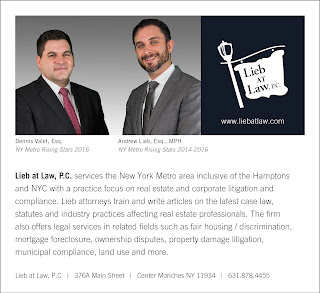On October 21, 2016 Governor Cuomo signed a
bill
into law that amends the New
York State Multiple Dwelling Law (“NYSMDL”) and the New
York City Administrative Code to prohibit the
advertising of certain New York City residential rentals with lease terms of less
than 30 days. Although many short-term rentals in New York City are already
illegal in order to prevent dwelling units from being used as transient hotels
in violation of fire and building codes and other regulations, this law makes
it clear that the advertising of such
rentals is also prohibited. Now that this bill has become law, those who list
rentals on Airbnb and other short-term rental websites may face a fine of up to
$1,000 for the first violation, $5,000 for the second violation, and $7,500 for
the third violation and any subsequent violations.
In 2010, the NYSMDL was amended to ban short-term
rentals with terms of less than 30 days for class A multiple dwellings, which
are dwellings used as permanent residences where each dwelling is occupied by
three or more independent families. A dwelling is considered a permanent
residence if it is occupied by the same natural person(s) for a period of 30
consecutive days or more.
Three exceptions exist to the 30-day restriction for
class A multiple dwellings rentals. First, occupants who cohabitate with boarders
or lodgers are exempt because they are sharing the space in a license scenario rather
than granting exclusive occupancy in a lease, which is a prerequisite to the applicability of the prohibition on
short-term rentals. Next, where the occupants live in the class A dwelling for less
than 30 days, but do not pay the permanent occupants for their stay, the
restriction is also inapplicable. This situation occurs frequently when friends
or family members stay at the residence when the owner is not home. Finally, class
A multiple dwellings explicitly do not include hotels, rooming houses, boarding
houses, club houses, and school dormitories.
There are also exemptions for some Class A dwelling
units that are grandfathered from the prior law. This grandfathering occurred
where a Class A dwelling was constructed before a specific date and was historically
and continuously used for purposes other than as permanent residences. These
units were allowed to convert to Class B (which is a class that includes, but
is not limited to, hotels, rooming houses, boarding houses, club houses, and
college dormitories) within 2 years after the effective date of the 2010 law if
the owners could obtain a Class B certificate of occupancy and complied with
all of the conditions and requirements within this 2-year conversion period.
However, since these conditions and requirements were quite stringent, many
such dwellings did not qualify for this conversion. Furthermore, those that did
not convert to Class B by 2012 have missed their opportunity.
Despite the 2010 law, short-term rental websites such
as Airbnb have proliferated, each allowing individuals to list their apartments
on these websites for short periods which inherently violate the NYSMDL. Under
this new law, New York legislators have stopped the proliferation of these
advertisements in their tracks.
The NYSMDL only applies to cities with populations of 325,000
or more. Realistically, this means that NYSMDL only applies to New York City,
since it is the only city in the state with
a population of 325,000 or more. This new law essentially marks the end
of short-term listings on Airbnb in New York City. In the war against
short-term rentals that operate as illegal hotels, New York legislators has won
its latest battle.









